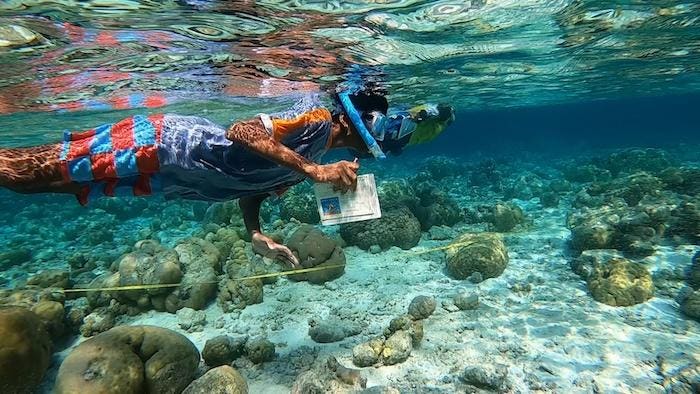The Muhyiddin Scouts are dedicated to protecting the vibrant corals off the coast of Vilimalé, Maldives. For UNICEF, the project is a shining example of the pivotal role young people play in the fight against climate change impacts.
How the ‘coral kids’ are taking climate action
On a quiet sandy beach in Vilimalé, Maldives, a short ferry ride away from the bustling capital of Malé, a group of teenage girls and boys called the Muhyiddin Scouts strap on snorkel gear and head out into an aquamarine sea to check on some corals.
They measure growth and count fish and make other underwater observations during this weekly swim offshore, an effort that began in 2019 to chart and attempt to undo some of the local damage caused by climate change.
When Malsa, 14, joined the Scouts in 2021, she did not know how to swim and was fearful of the ocean. “Through this project, I have learned how to swim, how to count the fishes, and I have learned how to embrace our coral reefs and the importance of them,” she says.
“I think because of this project, many of our parents have learned that these projects are really good and that we need to start similar projects. And many people have been inspired by us. And that was a really good accomplishment for me personally.”
Watch the video
A UNICEF priority: amplifying youth-led climate initiatives
For UNICEF, these kinds of youth-led initiatives are critical for driving climate action in the Maldives, a nation of 1,192 islands in the Indian Ocean, a few hundred miles southwest of India.
“The Maldives relies heavily on its delicate ecosystem for its very existence,” says Maeed Zahir, who rejoined the UNICEF Maldives staff in early 2022 as the country office’s climate resilience consultant. From 2016-2020, he was the team’s climate disaster risk reduction consultant.
“Our coral reefs serve as the bedrock of our place on this planet. However, this paradise faces an existential threat from climate change. Mitigating the impacts of this crisis begins with raising awareness, gaining knowledge and taking action. In this critical endeavor, it is the youth who are leading the way.”
By participating in the project, each Scout is gaining a valuable education, and an understanding and appreciation of local climate impacts that can only come from hands-on experience. Without first-hand nature-based experiences, UNICEF has found, students are less likely to care or take action to protect the natural environment.
Scout activities include nurturing diseased corals and transplanting them once they are brought back to health to stop coral bleaching — an effect of rising ocean temperatures — from spreading.
“By empowering and granting agency to the younger generation,” Zahir says, “we foster their capacity to address these pressing issues, strive for effective climate adaptation and build climate resilience.”
UNICEF Maldives, through its climate resilience flagship program, is dedicated to amplifying the crucial work of groups like the Muhyiddin Scouts and other youth-led initiatives.
UNICEF works with partners around the world to support and empower young people in their efforts to build resilience and adapt to the challenges posed by a changing climate. Learn more about how UNICEF is addressing the climate crisis.
Video edited by Tong Su for UNICEF USA.
Read the full article here










